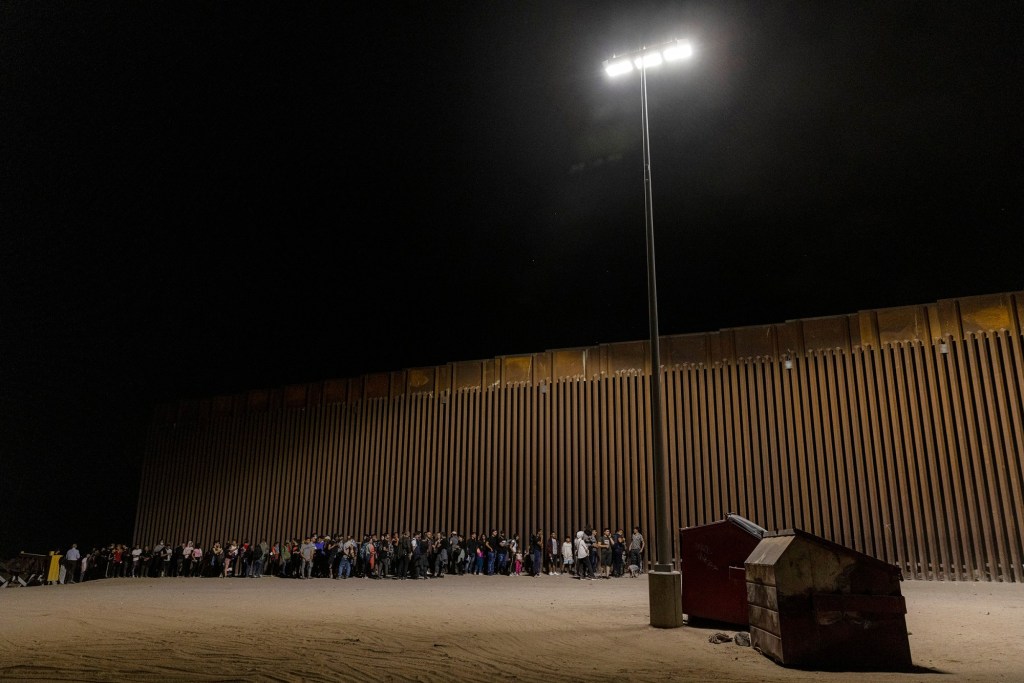
President Trump campaigned on a pledge to deport millions of people who came to the United States without going through the proper immigration channels, so it shouldn’t be any surprise that he is carrying through on his promise of deportations.
A sizable majority of Americans polled say they support deporting those who have entered our country illegally, and the simple argument that they have broken the law and deserve to face justice for it is not a point that’s up for debate.
After that, though, everything is in fact arguable. The details of how government enforces its laws do matter. That’s what you would likely say to an officer writing you a ticket for driving 66 in a 65-mph zone if you were simply keeping up with the flow of traffic.
And the recent highly showy — flamboyant, even, not to mention very expensive — deportations of 261 people, almost all of them Venezuelans, to, of all places, El Salvador provides more questions than answers. Besides being a numerical drop in the bucket, given the huge numbers of undocumented people living in the U.S., the administration’s unusual use of a law from 1798 called the Alien Enemies Act that has previously been used only during actual wartime for this deportation is, as well as being legally eccentric, probably unnecessary.
Or, as more than one federal judge is ruling, in itself contrary to the rule of law. We have something called due process in this country, and most of us are glad for that. While this administration does have a knack for carrying out its agenda with, well, flair, an attack on due process for the sake of looking tough is uncalled for, and ultimately counterproductive to any goal of carrying out mass deportations without running into legal roadblocks. Does the White House want to carry out its campaign promise efficiently, or does it want to look fancy doing it?
Perhaps all of these 261 people should be deported. If so, there are established ways of making that happen that are far less prone to abuse or involving the weird if photogenic outcome of sending the people to a newly established prison in El Salvador.
The administration says that most of the deportees are affiliated with the Venezuela-based Tren de Aragua gang, which President Trump has declared a terrorist group. Again, perhaps they are.
But defense lawyers for some of the outraged families of those deported say that the gang charges are mostly based on tattoos and social media postings, rather than on any sound legal ground. And even the tattoo business is flimsy at best. Most of us in Southern California are (unfortunately) familiar with actual gang tattoos. When one of those currently rotting in a San Salvador prison, Reyes Barrios, was taken into custody at Otay Mesa, he was showing up voluntarily for an asylum interview appointment. The arm tattoo in question — a crown atop a soccer ball — is an homage to the great Spanish team Real Madrid, his lawyers say. He was a soccer player and coach, in Venezuela and in the U.S. He’s never been charged with a crime.
Much as President Trump apparently admires the anti-gang tactics of Salvadoran strongman President Nayib Bukele, the choice of lockups here strikes us as entirely unsuitable.
In El Salvador, “the United States now has a tropical gulag,” Regina Bateson, a political scientist at the University of Colorado Boulder, told the Los Angeles Times. “The notion that the U.S. government is paying millions of dollars to another government to violate these people’s rights is horrifying.”
Due process is the foundation of our Constitution. Given its election campaign promises to do so, the Trump administration is well within its rights to, as other administrations have done, deport large amounts of people here illegally. But in this country, everyone gets a hearing to make sure that the government isn’t wrong in its allegations. Because the government does get a lot wrong. And there are already so many things wrong with this theatrical, not-so-mass deportation that it’s no wonder federal courts are calling for a halt to extra-legal tactics supposedly done in the name of the law.
Originally Published:



